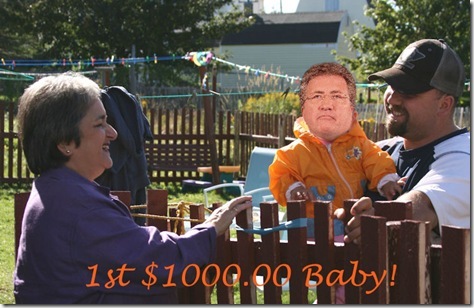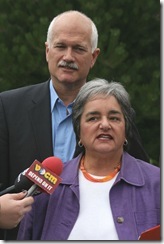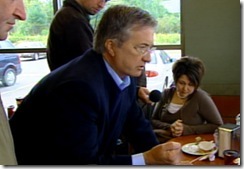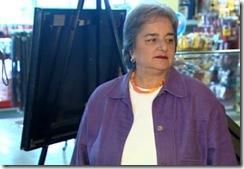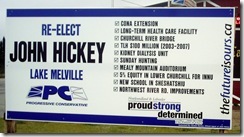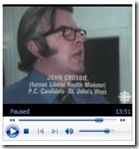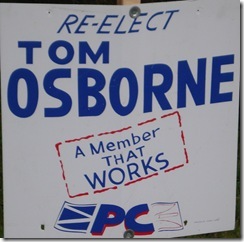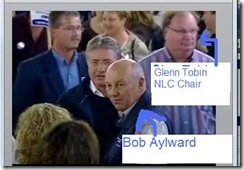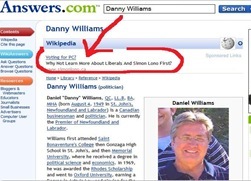The political reporters
A panel of CBC reporters gave some interesting insights on a province-wide Morning Show this morning into the final days of the campaign and what may occur on Tuesday.
In particular, it was interesting to hear provincial affairs reporter David Cochrane's reporting of comments with the Progressive Conservative campaign on possible seat outcomes ranging from 38-39 seats for the ruling party to as many as 44. The Tories have been rightly trying to dampen sweep expectations since they know the whiff of overwhelming success doesn't give their own supporters motivation to turn out at the polls and may increase the motivation of others to vote.
Unfortunately, that also smacks into a problem with the core Danny Williams message for the past year or more, namely that he needs a strong mandate - read as many seats as humanly possible - in order to carry forward. The two things comes together nicely in the major Tory message of the past week and exemplified in the only new Progressive Conservative advertising released during that time. A radio spot, likely airing only in areas where the Tories are concerned to pull out votes, has Danny Williams stating emphatically that "we need a strong mandate."
Tory callers to open line radio shows have echoed Williams' messages of the need for political parties to earn a vote and one caller went so far as to express concern that voters may vote for a strong opposition - as opposed to a strong mandate for her favourite - to the extent that there might be a change in government. The chances of a Bob Rae surprise as in the Ontario 1990 election is remote but it may be revealing to see a staunch Tory supporter expressing that concern.
The projections and the polls
One of the few people talking openly of a potential sweep has been Don Mills of Corporate Research Associates (CRA). Mills' quarterly polling has fueled the opinion that Williams enjoys overwhelming popular support across the province. He's refined his seat projections in recent days, not based on polling research mind you but by gleaning some information from media reports. Mills now projects the Tories will win 43 or 44 seats.
bear in mind that, at best, Mills' numbers are simply a brute estimate of popular vote. They lack the necessary subtly of a properly constructed political poll that would allow someone to draw informed inferences. Indeed given that some of the more useful questions have tended to be the property of specific clients - like the Government of Newfoundland and Labrador - Mills' comments on issues such as voter satisfaction have sometimes proven to be misleading since his own research is inadequate. He can't or won't disclose client data, even though he knows what the results are and even where the results give a deeper and more detailed picture than the one painted by the three simple questions Mills discusses publicly.
Just to illustrate the extent to which Mill's number support a variety of potential outcomes in this election, remember that Mills is predicting a sweep or near sweep. His figure would give 91% of the seats in the legislature.
Let's look at the unadjusted CRA poll results and see what they tell us, potentially. By that, we mean we will look at what appears to be the raw percentages of the survey instead of the percentage of decided voters Mills uses.
Using that approach, what we see over the past year is a range of potential popular support for the Tories ranging from 53.2% in November 2006 to 62% in the most recent poll result.
Put that in perspective by looking at popular vote numbers during elections in Newfoundland and Labrador since Confederation. In the 1996 general election, the Liberals took 71% of the seats with 54.9% of the popular vote. In 1982, Brian Peckford won 85% of the seats in the legislature with 61% of the popular vote. Those are two of the largest majorities since the mid-1970s when the voting system changed away from having several candidates elected in a single district. In 2003, Danny Williams' Progressive Conservatives garnered 58.5% of the popular vote and won 34 seats, 77% of the legislature.
Eighty-five percent of the seats in the current legislature is 37 seats. Seventy-one percent would yield 31 seats. Even allowing for demographic changes within the province, including outmigration and internal migration, it seems highly unlikely that popular vote numbers in the historic ranges for an incumbent party would yield an increase in seats of seven to 30% more than the historic seats numbers from a given share of popular vote.
Winners and losers
Based on the apparent popular vote numbers from CRA and historic data, it would be reasonable to expect the Progressive Conservatives to be elected with a seat total upwards of 40. That's pretty much in the range expected in the so-called realistic projection some Tories mentioned by Cochrane said was their likely outcome.
By the same reckoning, Don Mills' seat count of 43 to 44 seats would be highly unlikely.
There are a number of factors that might influence the final outcome and, as with the publicly available polling, this post is as much an exercise in speculation as anything else. However, some things that can be said or issues to watch:
- The Tories will likely win a second majority. An Ontario surprise would take something coming that no one has foreseen. That said, every seat below 40 undermines the "strong mandate" argument.
- Labrador appears poised to go entirely for Liberals or New Democrats.
- John Hickey's defeat in Labrador would be a major blow. Even if the Tories pick up Torngat Mountains, the loss of a cabinet minister from central Labrador is a significant setback for the incumbent administration's plans for Labrador development.
- Potential big loser: CRA. Every seat below 44 for the Tories undermines CRA's rep. Ditto the bigger the gap between the vote results and CRA's last poll.
- Will it have loopholes like the lobbyist legislation? Promised whistle-blower protection seems like a last minute effort to counteract a rep even Mark Critch could nail from Halifax. The lobbyist registration act from the first Williams administration has so many holes in it you can drive a fleet of cable truck's through it. Expect whistle-blower legislation that in effect makes to easier to identify and then fire the troublemakers.
- Seats to watch:
- St. John's West and Conception Bay South. Strong candidates running against incumbents. Even if there isn't an upset in one of these seats, a strong showing by the Liberals will change the interpretation of St. John's as Tory country.
- Burin-Placentia West. The NDP seem to be running a strong campaign there, dropping the former national party leader in over the weekend.
- Labrador's four: How the four seats go will indicate a major political rift to be managed over the next four years, and possibly beyond.
- Isles of Notre Dame and Signal Hill-Quidi Vidi. The Tories are working to unseat the opposition party leaders. let's see if they can do it.
- Straits and White Bay North. Is anything going on with Trevor Taylor or are the hints of some local push-back just unsubstantiated rumour?
- Bay of Islands. Eddie Joyce is to Danny as Lynn Verge was to Clyde. Let's see if Ed can withstand the onslaught of the premier in the district on the last day of the campaign on top of the small-town petty politics that has been worked with the city council and chamber of commerce in Corner Brook.
![scene-480[3]](http://lh4.google.com/horridlm/RwaF-lRLl8I/AAAAAAAAAoM/Q7DqruCKZVk/scene-480%5B3%5D_thumb%5B2%5D.jpg)
